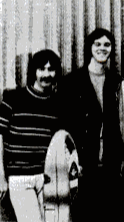Country rock is a music genre that fuses rock and country. It was developed by rock musicians who began to record country-flavored records in the late 1960s and early 1970s. These musicians recorded rock records using country themes, vocal styles, and additional instrumentation, most characteristically pedal steel guitars. Country rock began with artists like Buffalo Springfield, Michael Nesmith, Bob Dylan, Nitty Gritty Dirt Band, the Byrds, the Flying Burrito Brothers, The International Submarine Band and others, reaching its greatest popularity in the 1970s with artists such as Emmylou Harris, the Eagles, the New Riders of the Purple Sage, Linda Ronstadt, Little Feat, Poco, Charlie Daniels Band, and Pure Prairie League. Country rock also influenced artists in other genres, including The Band, the Grateful Dead, Creedence Clearwater Revival, The Rolling Stones, and George Harrison's solo work, as well as playing a part in the development of Southern rock.

Buffalo Springfield was a rock band formed in Los Angeles by the Canadian musicians Neil Young, Bruce Palmer and Dewey Martin and the American musicians Stephen Stills and Richie Furay. The group, widely known for the song "For What It's Worth", released three albums and several singles from 1966 to 1968. Their music combined elements of folk music and country music with British Invasion and psychedelic rock influences. Like contemporary band the Byrds, they were key to the early development of folk rock. The band took their name from a steamroller parked outside their house.

Norman Russell Young was an American guitarist, vocalist and songwriter, best known as one of the frontmen in the influential country rock and Americana band Poco.

Poco was an American country rock band originally formed in 1968 after the demise of Buffalo Springfield. Guitarists Richie Furay and Jim Messina, former members of Buffalo Springfield, were joined by multi-instrumentalist Rusty Young, bassist Randy Meisner, and drummer George Grantham. Meisner quit the band while they were recording their first album, Pickin' Up the Pieces, though his bass and backing vocal parts were kept in the final mix. He was replaced by Timothy B. Schmit in 1969, and Messina left in 1970 to be replaced by Paul Cotton. The line-up would change numerous times over the next several decades, with Rusty Young being the only constant member. A reunion of the founding members occurred in the late 1980s-early 1990s, and the band has continued in some form through 2021, though they retired from active touring in 2013, with Young citing health concerns as the primary cause of his retirement. Young died from a heart attack in April 2021.

Last Time Around is the third and final studio album by the Canadian-American folk rock band Buffalo Springfield, released in July 1968. The line-up at the time officially consisted of Neil Young, Stephen Stills, Richie Furay, Dewey Martin, Bruce Palmer, and Jim Messina, though the band itself was essentially broken up and the album was put together from previous recordings, some made up to a year earlier. Jim Messina acted as the album producer and mixing engineer, with input from Furay, as the two compiled the record to fulfil the band's last contractual obligation to its label. A number of guest musicians appeared on the album, notably pedal steel guitar player Rusty Young.

Paul Richard Furay is an American musician and Rock & Roll Hall of Fame member. He is best known for forming the bands Buffalo Springfield with Stephen Stills, Neil Young, Bruce Palmer, and Dewey Martin, and Poco with Jim Messina, Timothy B. Schmit, Rusty Young, George Grantham and Randy Meisner. His best known song was "Kind Woman," which he wrote for his wife, Nancy.

James Messina is an American musician, songwriter, singer, guitarist, recording engineer, and record producer. He was a member of the folk rock group Buffalo Springfield, a founding member of the pioneering country rock band Poco, and half of the soft rock duo Loggins and Messina with Kenny Loggins.

Pickin' Up the Pieces is the debut album by country rock band Poco, released in 1969. It was one of the earliest examples of the emerging genre of country rock. Several of the songs date back to Richie Furay's days in Buffalo Springfield. An early version of "What a Day" was included on the Buffalo Springfield box set in 2001.
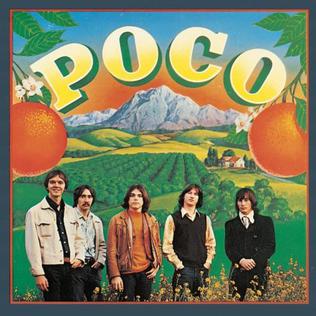
Poco is the second album by American country rock band Poco. This is the band's first album to feature Timothy B. Schmit who replaced Randy Meisner on electric bass. The Messina-penned "You Better Think Twice" became a signature song for the band. A copy of this album hangs in the Poco exhibit in the Country Music Hall of Fame in Nashville along with the jacket Rusty Young wears on the back cover. The album was dedicated to David Geffen who "picked up the pieces".

Deliverin’ is the third album, and first live album, by the American country rock band Poco. Jim Messina quit the band in October 1970, prior to the release of the album. WBCN DJ Charles Laquidara wrote the liner notes.

From the Inside is the third studio album by the American country rock band Poco. The band was reportedly unhappy with it following its release. This album was the first to include new member Paul Cotton as lead guitarist, who replaced Jim Messina. Messina would go on to form his partnership with Kenny Loggins.
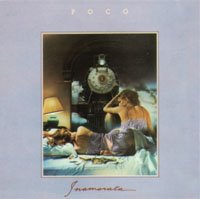
Inamorata is the sixteenth studio album by the country rock band Poco, released in 1984. Featuring guest spots by former members Timothy B. Schmitt, Richie Furay and George Grantham, this would be the last album that the band would record for Atlantic Records. After this the original line up would reform for the 1989 release Legacy.

Legacy is a studio album by the American country rock band Poco, released in 1989. The album reunited the five original members of the group; they had never recorded together. It contained two top-40 singles, "Call It Love" and "Nothin' to Hide".
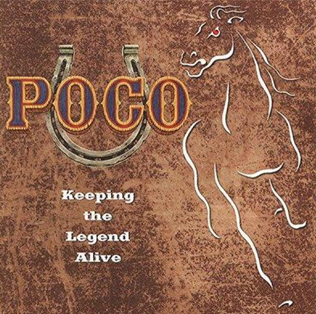
Keeping the Legend Alive is the 22nd album and 4th live album by the country rock band Poco. It was re-released in 2006 under the title "Alive In The Heart Of The Night." It includes original members Richie Furay, *George Grantham and Rusty Young, Paul Cotton who replaced Jim Messina in 1970 and Jack Sundrud a member since the 1990s.

The first in a long line of compilation albums, The Very Best of Poco features highlights from the band's career from 1969–1974. When released on CD in the late 1980s, the album omits two tracks originally on the album, "Railroad Days" and "Skatin" for space reasons. Both were reinstated for the remastered BGO import edition released in 1998.

The Forgotten Trail (1969–74) is a 2-CD collection of the greatest hits of Poco recorded during the group's work for Epic Records, which included their first eight albums.
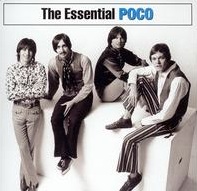
The Essential Poco is a compilation album of recordings by the band Poco released in 2005 as part of Sony BMG's Essential series.
"Pickin' Up the Pieces" is the first song recorded by pioneer country rock band Poco. Written by founding member Richie Furay, the song was the title track of Poco's first album.
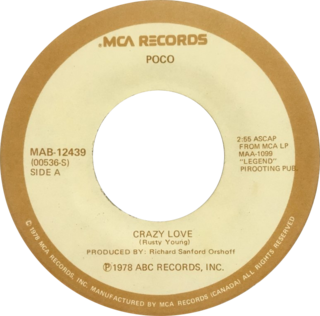
"Crazy Love" is a 1979 hit single for the country rock group Poco introduced on the 1978 album Legend. Written by founding group member Rusty Young, "Crazy Love" was the first single by Poco to reach the Top 40 and remained the group's biggest hit, with a special impact as an Adult Contemporary hit, being ranked by Billboard as the #1 AC song for the year 1979.
